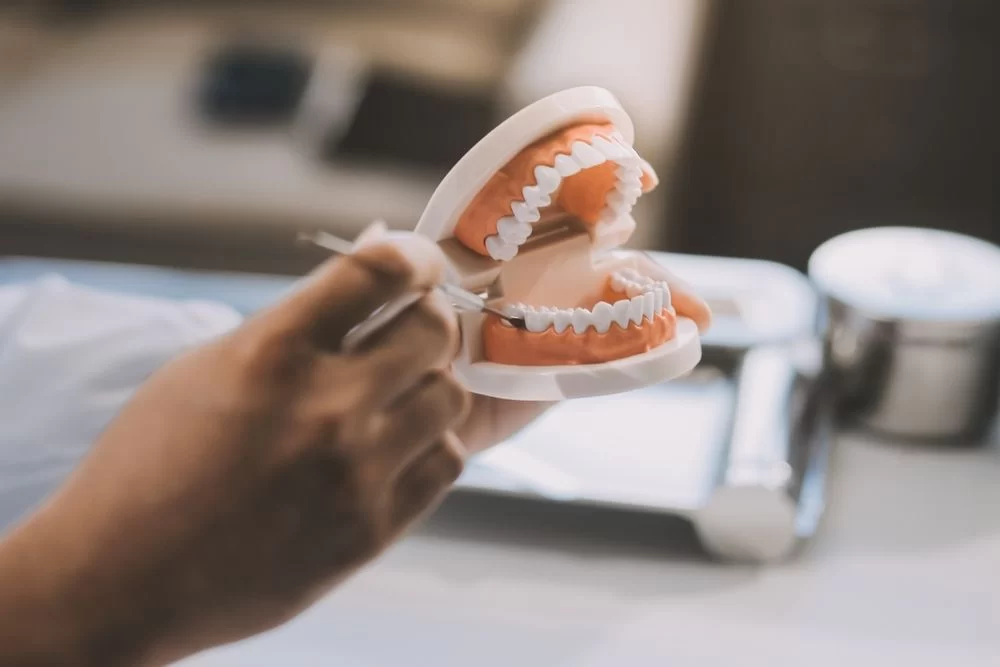
Why Dental Care is Essential for People with Dentures
For individuals who wear dentures, maintaining good oral hygiene is just as important as it is for people with natural teeth. While dentures may seem like a convenient solution for missing teeth, they require regular care and attention to keep them in optimal condition. Not only does proper dental care ensure that your dentures last longer, but it also helps to maintain your overall oral health and comfort. In this article, we’ll explore why dental care for people with dentures is crucial and provide tips for keeping your dentures in the best possible shape.
The Unique Challenges of Denture Care
Unlike natural teeth, dentures are removable and can be prone to wear and tear over time. Because dentures sit on the gums, they can create an environment that encourages bacteria build-up, which could lead to infections, gum irritation, or bad breath if not cleaned properly. Additionally, dentures can affect the fit of your mouth, and if not cared for properly, they can become uncomfortable and loose. Regular dental care is key to addressing these challenges and ensuring that dentures continue to perform their best.
1. Cleaning Your Dentures Regularly
Just like your natural teeth, dentures require regular cleaning to remove food particles, plaque, and bacteria. If left uncleaned, your dentures may develop odors, become stained, or cause gum inflammation. Cleaning dentures regularly helps prevent these issues and contributes to better overall oral health. Here are some key steps to keep in mind:
- Brush your dentures daily with a soft-bristled toothbrush or a denture brush to remove debris and plaque. Avoid using regular toothpaste, as it may be too abrasive for dentures.
- Rinse your dentures thoroughly after eating to remove any food particles. This helps to prevent bacteria from building up and causing bad breath.
- Soak your dentures in a cleaning solution or mild denture cleanser overnight to kill germs and keep them fresh.
2. The Importance of Proper Denture Storage
When you’re not wearing your dentures, proper storage is essential to maintain their shape and prevent damage. Dentures can become warped or cracked if they are exposed to heat or dry out. To protect your dentures when you’re not using them:
- Always store your dentures in a clean, dry place when you’re not wearing them.
- Keep your dentures in a container with water or a denture soak to prevent them from drying out.
- Avoid leaving your dentures in hot water, as this can cause them to lose their shape.
3. Regular Check-ups with Your Dentist
Regular dental check-ups are important not just for the health of your remaining natural teeth, but also for the maintenance and fit of your dentures. Over time, your gums and bone structure may change, affecting how your dentures fit. A visit to the dentist allows for adjustments to be made to ensure your dentures remain comfortable and effective. Your dentist will also check for any signs of gum irritation, infections, or other oral health concerns.
Most people with dentures should visit their dentist at least once a year, but your dentist may recommend more frequent visits depending on your specific needs. During these visits, your dentist may also clean and inspect your dentures to make sure they are in good condition.
Preventing Denture-Related Issues
While dentures can improve the quality of life for many people, they can also present certain challenges. The key to preventing denture-related issues lies in maintaining proper care and promptly addressing any problems that arise. Here are some common denture-related issues and how to prevent them:
1. Gum Irritation and Inflammation
Wearing dentures can sometimes lead to gum irritation or inflammation, especially if the dentures don’t fit properly. This can cause discomfort and, if left untreated, can lead to infection. To prevent gum irritation:
- Ensure that your dentures fit properly by visiting your dentist regularly for adjustments.
- Remove your dentures at night to give your gums a break and allow them to heal.
- Use a denture adhesive sparingly, as too much adhesive can interfere with the proper fit of your dentures.
2. Denture Stains
Dentures can become stained over time, especially if you drink coffee, tea, or other staining beverages. While this doesn’t affect the functionality of your dentures, it can be unsightly and affect your confidence. To prevent staining:
- Clean your dentures immediately after consuming foods or beverages that can stain, such as coffee, tea, or red wine.
- Use a denture-specific cleaner to remove stains. Regular toothpaste can be too abrasive and may damage your dentures.
- Consider using a denture polish to keep your dentures looking bright and fresh.
3. Bad Breath and Oral Infections
Bad breath, or halitosis, is a common issue for people with dentures. This is often caused by bacteria build-up on the dentures or in the mouth. Additionally, an improperly fitted denture can lead to gum irritation or infection, which can also contribute to bad breath. To prevent bad breath:
- Clean your dentures thoroughly, especially after meals, to remove food particles and plaque.
- Brush your tongue and gums daily to eliminate bacteria that can cause bad breath.
- Stay hydrated, as dry mouth can also contribute to bad breath.
Adjusting to Life with Dentures
Adjusting to life with dentures can take time, especially if you’re new to wearing them. It’s normal to feel some discomfort or notice slight changes in your speech or eating habits as you get used to wearing dentures. However, with time and proper care, most people adapt and begin to enjoy the benefits of dentures, including improved speech, eating ability, and appearance.
It’s important to be patient during the adjustment period and to communicate with your dentist if you experience any discomfort or problems with your dentures. Your dentist can make necessary adjustments to ensure your dentures fit comfortably and function properly.
4. Practicing Good Oral Hygiene Despite Wearing Dentures
Even though dentures replace your natural teeth, it’s essential to continue practicing good oral hygiene to maintain overall oral health. People with dentures should still brush their gums, tongue, and the roof of their mouth each morning before inserting their dentures. This helps to remove bacteria and promote circulation in your gums, ensuring a healthy foundation for your dentures.
Additionally, if you have any remaining natural teeth, it’s important to continue brushing and flossing them daily to prevent plaque build-up, gum disease, and cavities.
In Conclusion
Dental care for people with dentures is not just about maintaining the appearance of your dentures, but also about preserving the health of your gums and overall oral hygiene. By following proper cleaning routines, visiting your dentist regularly, and taking the necessary steps to prevent common denture issues, you can enjoy the benefits of dentures for years to come. Remember, your dentures are an important investment in your health, so be sure to care for them as you would your natural teeth.







 Contemporary Dental Implant Centre4.0 (13 review)
Contemporary Dental Implant Centre4.0 (13 review) Little Grins Dental4.0 (79 review)
Little Grins Dental4.0 (79 review) UI Health Mile Square Health Center - Primary and Immediate Care3.0 (13 review)
UI Health Mile Square Health Center - Primary and Immediate Care3.0 (13 review) Stoneridge Dental4.0 (384 review)
Stoneridge Dental4.0 (384 review) Sandra L. Vargas, DMD3.0 (8 review)
Sandra L. Vargas, DMD3.0 (8 review) Dr. Melanie Williamson, DMD5.0 (5 review)
Dr. Melanie Williamson, DMD5.0 (5 review) The Importance of Oral Health Education During Pregnancy for a Healthy Pregnancy
The Importance of Oral Health Education During Pregnancy for a Healthy Pregnancy Best Tips for Brushing Your Teeth Properly for Healthy Gums: Essential Techniques for Oral Health
Best Tips for Brushing Your Teeth Properly for Healthy Gums: Essential Techniques for Oral Health Why Skipping Dental Checkups Can Lead to Bigger Oral Health Problems
Why Skipping Dental Checkups Can Lead to Bigger Oral Health Problems Advantages of Porcelain Dental Restorations
Advantages of Porcelain Dental Restorations How Can Diabetes Cause Tooth and Gum Problems? Preventing and Managing Oral Health Issues
How Can Diabetes Cause Tooth and Gum Problems? Preventing and Managing Oral Health Issues Healthy Habits for Promoting Good Oral Health and Hygiene: Tips for a Healthy Smile
Healthy Habits for Promoting Good Oral Health and Hygiene: Tips for a Healthy Smile